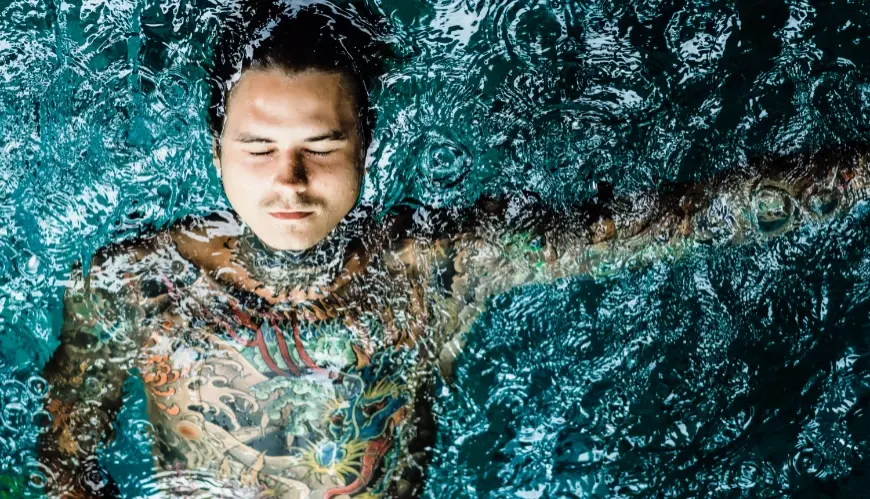Every alternate day, a fresh health fad appears that promises to enhance your health with ease. Although many of these trends might appear dubious, certain ones like cold plunge pools truly possess efficacy.
Indeed, the concept of submerging oneself in an icy pool doesn't seem attractive at first thought. However, there's been significant recognition granted to cold plunging from the fitness and health fraternity due to its multitude of beneficial impacts on wellness. Here are some insights you might find useful about cold plunge pools.
Cold Plunge Pools: An Overview
Cold plunge pools, alternatively known as ice baths or cold water immersion (CWI), are compact tubs filled with water that has a temperature range of 45 to 55 degrees Fahrenheit. The suggested benefits include triggering certain reactions within the body which may be highly beneficial for your mental and physical health, states Jamie Bacharach; Dipl.Ac who is an accredited practitioner at Acupuncture Jerusalem.
The practice of using cold plunge pools, CWI and cryotherapy is not a recent trend. In reality, it dates back thousands of years right to 3500 BC with people successfully utilising these methods for various reasons such as socializing and relaxation. Ancient Greek philosopher Hippocrates made use of this phenomena in his medicinal routines. Additionally, Claudius Galen – a noteworthy Roman medical specialist – harnessed the power of chilled bathing when dealing with Tertian fever (a strain of malaria). Famed physiologist James Currie from the late eighteenth century also noticed its potential usefulness.
Varieties of Plunge Pools
Several distinct styles and variations exist when it comes to cold-plunging, each encapsulating its own set of benefits. This is a guide highlighting the details on numerous plunge pool varieties.
Bodies of Water in Nature
In the realm of cold plunging, it's commonly practiced within naturally occurring water bodies that exhibit colder temperatures. Examples include lakes, rivers and even sea waters. Bacharach emphasizes on this form as being considered superior in terms of therapeutical advantages. Paradoxically though, it also demands more cautionary measures - predominantly due to an increased probability of coming into contact with potentially dangerous aquatic animals or the risk associated with drowning.
Cold Immersion: Ice Baths
An ice bath, the most basic form of a cold plunge pool, is merely a spacious vessel filled with water and ice. This cost-effective and straightforward method could be implemented even in your typical bathtub. As Bacharach notes, this routine appeals to various athletes since they utilize ice baths for muscle repair and wellness after strenuous activities.
Immersion Tanks
Immersion tanks, often crafted from stainless steel or fiberglass, are designed with cold plunging in mind. These tanks grant more autonomy over the experience according to Bacharach—allowing users to set the temperature as preferred and adjust it based on their comfort. Numerous immersion tanks come with embedded timers for monitoring the duration of your time spent in the tank.
Implications of Polar Plunge Pools on the Human Body
Plunging into a pool filled with cold water can have numerous immediate impacts. Let's explore how such extreme shifts in temperature might modify your bodily performance.
Influences the Body's Stress Reaction
Firstly, immersion in chilly water can greatly energize the vagus nerve. This is noteworthy because it is longest nerve within human beings. It stretches down our body's central axis and interacts with all of the internal organs which are responsible for digestion, respiration, swelling and additional functions as reported by Bill Daniels CPT and CSCS, who also happens to be a certified personal fitness trainer as well as founder of Beyond Fitness.
Daniels explained that once activated, the vagus nerve determines the parasympathetic rhythm inside our bodies assisting in lessening stress levels"Cold water helps alleviate inflammation symptoms while instilling feelings of tranquillity,” he added. "Moreover, it improves mental focus whilst generally decreasing any other problems originated from stress.”
Decreases Swelling
Exposure to severe low temperatures triggers a contractive response in your blood vessels, consequently cutting down on the blood distribution across your physique. This assists notably in diminishing inflammation as well as muscular distress.
"Whenever your muscles are compromised or merely weary from strenuous activity, your system enhances its circulation towards these regions instigating swelling and soreness,” clarifies Bacharach. "Through indulging in a frigid dip, you limit blood supply to these muscles resulting in decreased inflammation and pain.”
Mood Enhancement
Dipping into chilly water prompts your body to secrete various hormones. This includes stress-related hormones such as noradrenaline and cortisol, along with dopamine - a hormone often referred to as the "happiness" hormone. The alteration in our brain's chemistry caused by these mood-lifting hormones is highlighted by Bacharach. This typically results in diminished stress levels and mood elevation.
Understanding the Effects of Using an Infrared Sauna
Post-Workout Healing and Athletic Performance Enhancement
Athletes have long turned to cold plunge pools as an effective post-workout recovery strategy. Submerging in icy water, Bacharach elucidates, triggers a slowdown in metabolic processes which consequently dampens the body's physiological activities rate. This phenomenon aids healing from minuscule muscle tears accrued during physical exercise - pivotal stepping stones toward muscular development and growth.
Diving into chilly waters following vigorous fitness routines has been noted to be advantageous due to its ability to curb swelling and inflammation that may follow intense exercises or games. In addition, it brings pain levels down noticeably freeing athletes for another session sooner than expected if they had not partaken in a cold plunge, as expounded by Bacharach.
The Psychological Advantages
An intense encounter with chilly water can have a significant impact on our neurological system. This is mainly triggered by the release of hormones that improve mood and induce feelings of pleasure. One analysis discovered that when individuals were introduced to cold waters, plasma noradrenaline concentrations escalated by 530% while dopamine levels rose by 250%. According to Bacharach, it is typical for these types of hormonal shifts to generate satisfaction and happiness.
Bacharach highlights the role this bodily response has in combating chemical stressors through brain rewiring processes fueled by positive neurochemicals. "Although mental resilience plays an essential part," she comments, "fundamentally it is our brain's chemistry that largely dictates how we feel."
These beneficial hormones not only produce feelings of joy but also enhance mental sharpness by eliminating distractions. Studies suggest an escalation in dopamine levels could actually serve as a motivating factor prompting people to tackle more intricate and challenging tasks.
Augmenting the Immune System
Engaging in frequent physical exertion and maintaining a nutritionally balanced diet are undeniably top-notch strategies for augmenting your internal defense mechanism - the immune system. However, empirical data has signified that indulging in cold immersions could invigorate the immunity as well. A specific research endeavor from Netherlands suggested that individuals who integrated cold escapades into their showers lasting either 30, 60 or 90 seconds for three months consecutively observed a marked drop in the count of sick days they needed to avail.
The human body houses white blood cells termed leukocytes which serve pivotal functions in battling ailments and diseases by proactively collaborating with our immune systems. "During an icy plunge, these leukocytes are triggered inferable to your body setting off its instinctive emergency response mechanisms", elucidates Bacharach. "Upon activation of these cells, they enhance their operability against disease factors thereby fortifying our natural defenses."
Interestingly, when exposed to frigid temperatures, your lymphatic system becomes active causing contractions which push fluid through vessels called lymph nodes scattered throughout various parts of our bodies which eventually aids in ridding harmful toxins thus contributing positively towards boosting overall immunity.
5 Simple Exercises to Strengthen Your Immunity
Health Precautions and Safety Measures
In case you're pondering experimenting with cold plunge pools, it's imperative to ensure your safety. Here are several essential tips and guidelines for secure engagement in cold water immersion practices.
Begin Gradually
Instead of attempting to "take the plunge" by jumping into cold water directly, pacing yourself is crucial. If you're unfamiliar with immerging in frigid waters, begin with short durations — a 30-second dip can be an excellent starting point. Over time, your body will acclimate to this stimulating new regime.
Bacharach suggests daily dips aren't necessary. It's sufficient to indulge in the cold plunge three or four times weekly to reap its benefits. Initially, strive for one up-to-three-minute-long session of exposure per day. As you grow comfortable over time and as your body adjusts better, remaining immersed for five to ten minutes should become easier.
Pay Attention to Your Physiological Signals
Should you encounter any distress or uneasiness, promptly exit the water. Emphasizing that it's not worth persisting in spite of your well-being merely for the adventure, Bacharach cautions. Always prioritize your body's signals above all else.
Be Aware of Your Constraints
Persons with cardiac conditions, respiratory problems or vascular diseases need to stay away from cold plunges due to its effect on blood vessels as emphasized by Bacharach. She furthermore advises against engaging in cold plunges during pregnancy seeing that it can intensify the strain on one's body.
Understand the Dangers linked with Hypothermia
Even if it happens infrequently, hypothermia is a hazardous medical condition that can result in death. "Should you notice any signs of hypothermia like trembling, disorientation or impaired speech, exit from the water instantly and consult for healthcare services," Bacharach advises further.
Conclusion
Plunging into cold water can be highly beneficial for your overall health. This practice not only enhances your well-being, but it also aids in curtailing the body's stress response. It assists in diminishing inflammation and muscular discomfort, which is particularly advantageous for athletes. Notably, cold immersion positively impacts your cardiovascular system and blood circulation while promoting the secretion of mood-enhancing endorphins.
However, safety must always come first when engaging in this regimen—you should gradually accustom yourself to the process and determine whether you may be at high risk. Keeping these precautions top-of-mind will allow you to safely reap numerous health dividends from each plunge into chill waters.




